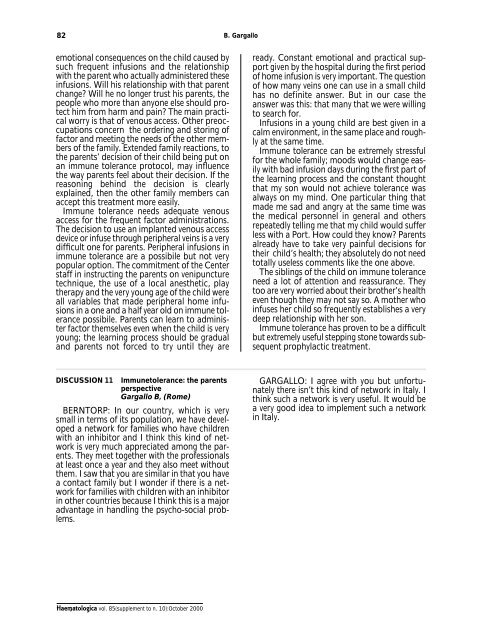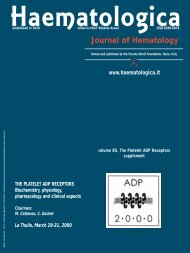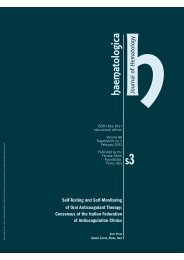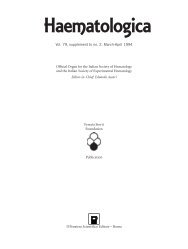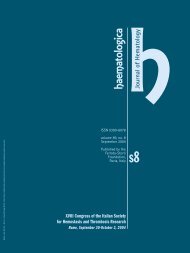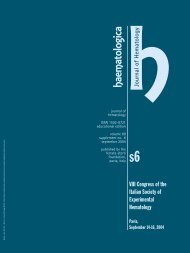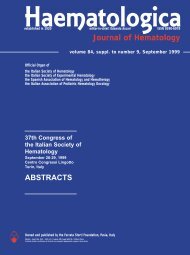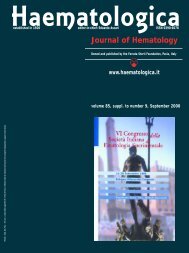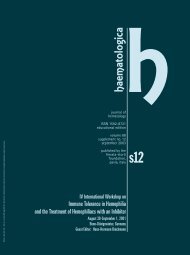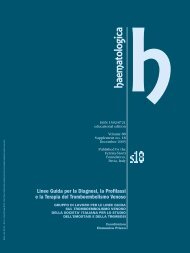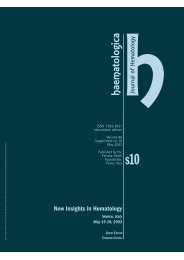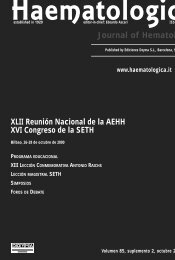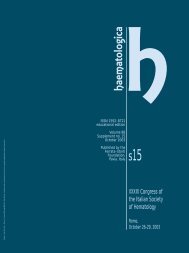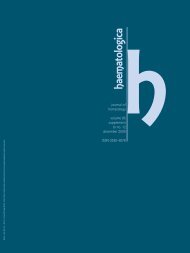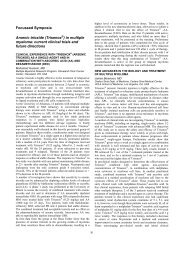Haematologica 2000;85:supplement to no. 10 - Supplements ...
Haematologica 2000;85:supplement to no. 10 - Supplements ...
Haematologica 2000;85:supplement to no. 10 - Supplements ...
You also want an ePaper? Increase the reach of your titles
YUMPU automatically turns print PDFs into web optimized ePapers that Google loves.
82<br />
B. Gargallo<br />
emotional consequences on the child caused by<br />
such frequent infusions and the relationship<br />
with the parent who actually administered these<br />
infusions. Will his relationship with that parent<br />
change Will he <strong>no</strong> longer trust his parents, the<br />
people who more than anyone else should protect<br />
him from harm and pain The main practical<br />
worry is that of ve<strong>no</strong>us access. Other preoccupations<br />
concern the ordering and s<strong>to</strong>ring of<br />
fac<strong>to</strong>r and meeting the needs of the other members<br />
of the family. Extended family reactions, <strong>to</strong><br />
the parents’ decision of their child being put on<br />
an immune <strong>to</strong>lerance pro<strong>to</strong>col, may influence<br />
the way parents feel about their decision. If the<br />
reasoning behind the decision is clearly<br />
explained, then the other family members can<br />
accept this treatment more easily.<br />
Immune <strong>to</strong>lerance needs adequate ve<strong>no</strong>us<br />
access for the frequent fac<strong>to</strong>r administrations.<br />
The decision <strong>to</strong> use an implanted ve<strong>no</strong>us access<br />
device or infuse through peripheral veins is a very<br />
difficult one for parents. Peripheral infusions in<br />
immune <strong>to</strong>lerance are a possibile but <strong>no</strong>t very<br />
popular option. The commitment of the Center<br />
staff in instructing the parents on venipuncture<br />
technique, the use of a local anesthetic, play<br />
therapy and the very young age of the child were<br />
all variables that made peripheral home infusions<br />
in a one and a half year old on immune <strong>to</strong>lerance<br />
possibile. Parents can learn <strong>to</strong> administer<br />
fac<strong>to</strong>r themselves even when the child is very<br />
young; the learning process should be gradual<br />
and parents <strong>no</strong>t forced <strong>to</strong> try until they are<br />
ready. Constant emotional and practical support<br />
given by the hospital during the first period<br />
of home infusion is very important. The question<br />
of how many veins one can use in a small child<br />
has <strong>no</strong> definite answer. But in our case the<br />
answer was this: that many that we were willing<br />
<strong>to</strong> search for.<br />
Infusions in a young child are best given in a<br />
calm environment, in the same place and roughly<br />
at the same time.<br />
Immune <strong>to</strong>lerance can be extremely stressful<br />
for the whole family; moods would change easily<br />
with bad infusion days during the first part of<br />
the learning process and the constant thought<br />
that my son would <strong>no</strong>t achieve <strong>to</strong>lerance was<br />
always on my mind. One particular thing that<br />
made me sad and angry at the same time was<br />
the medical personnel in general and others<br />
repeatedly telling me that my child would suffer<br />
less with a Port. How could they k<strong>no</strong>w Parents<br />
already have <strong>to</strong> take very painful decisions for<br />
their child’s health; they absolutely do <strong>no</strong>t need<br />
<strong>to</strong>tally useless comments like the one above.<br />
The siblings of the child on immune <strong>to</strong>lerance<br />
need a lot of attention and reassurance. They<br />
<strong>to</strong>o are very worried about their brother’s health<br />
even though they may <strong>no</strong>t say so. A mother who<br />
infuses her child so frequently establishes a very<br />
deep relationship with her son.<br />
Immune <strong>to</strong>lerance has proven <strong>to</strong> be a difficult<br />
but extremely useful stepping s<strong>to</strong>ne <strong>to</strong>wards subsequent<br />
prophylactic treatment.<br />
DISCUSSION 11 Immune<strong>to</strong>lerance: the parents<br />
perspective<br />
Gargallo B, (Rome)<br />
BERNTORP: In our country, which is very<br />
small in terms of its population, we have developed<br />
a network for families who have children<br />
with an inhibi<strong>to</strong>r and I think this kind of network<br />
is very much appreciated among the parents.<br />
They meet <strong>to</strong>gether with the professionals<br />
at least once a year and they also meet without<br />
them. I saw that you are similar in that you have<br />
a contact family but I wonder if there is a network<br />
for families with children with an inhibi<strong>to</strong>r<br />
in other countries because I think this is a major<br />
advantage in handling the psycho-social problems.<br />
GARGALLO: I agree with you but unfortunately<br />
there isn’t this kind of network in Italy. I<br />
think such a network is very useful. It would be<br />
a very good idea <strong>to</strong> implement such a network<br />
in Italy.<br />
<strong>Haema<strong>to</strong>logica</strong> vol. <strong>85</strong>(<strong>supplement</strong> <strong>to</strong> n. <strong>10</strong>):Oc<strong>to</strong>ber <strong>2000</strong>


